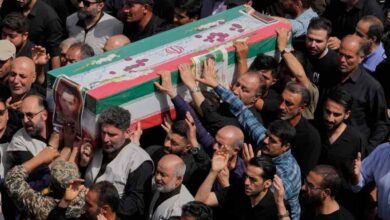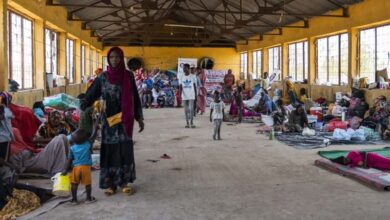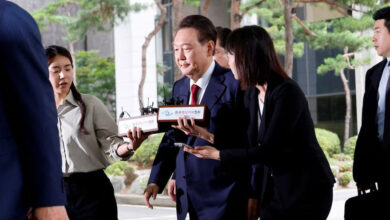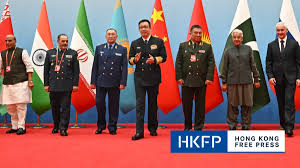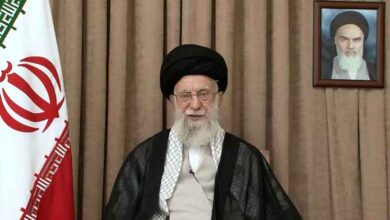On Feb. 1, Myanmar’s military detained State Counselor Aung San Suu Kyi and President Win Myint in the country’s first coup since 1988, bringing an end to a decade of civilian rule.
The Suu Kyi-led National League for Democracy had won a landslide in a general election in November. But the military has claimed the election was marred by fraud.
Follow the latest developments here (Yangon time):
Monday, March 22
8:30 p.m. European Union foreign ministers have adopted travel bans and asset freezes on people they hold responsible for the Myanmar coup, marking the EU’s strongest action to date in response to the ouster of the country’s elected government.
Of the 11 people sanctioned, 10 are top military brass, including armed forces Commander-in-Chief Min Aung Hlaing and Deputy Commander-in-Chief Soe Win.
“The travel ban impedes those listed from entering or transiting through EU territory, while the asset freeze covers the funds or economic resources in the EU of the listed persons,” according to a European Council statement. “In addition, EU citizens and companies are forbidden from making funds available to the listed individuals and entities.”
Monday’s EU actions did not include changes to trade preferences that help Myanmar’s garment industry, an important source of jobs and foreign currency. Critics say such a move would hurt ordinary working people.
“The EU will continue to review all of its policy options, including additional restrictive measures against economic entities owned or controlled by the military,” the statement says. “At the same time, the EU aims to ensure that its measures do not have an adverse effect on the general population.”
One notable objector to Monday’s sanctions is Hungary. Hungarian Foreign Minister Peter Szijjarto calls the penalties, along separate ones on Chinese officials, “harmful” and “pointless.”
3:30 p.m. The European Union will on Monday impose sanctions on 11 individuals linked to the coup, the EU’s foreign policy chief Josep Borrell says as he arrives for a meeting of EU foreign ministers in Brussels.
“On … Myanmar we are going to take sanctions against 11 persons involved in the coup and the repression of the demonstrators,” Borrell said, adding the situation in the country was deteriorating. The names of the individuals are expected to be made public once the sanctions are formally decided by ministers.
11:30 a.m. Drivers in Yangon sounded their horns on major roads as protest against the coup. Meanwhile, large protests were less visible in central Yangon as the military stepped up its crackdown.
9:30 a.m. To mark the one-month anniversary of one of the biggest demonstrations since the coup and a national strike on Feb. 22, activists on social media urged people to join a car convoy protest on Monday. They want vehicles to drive through intersections honking horns while occupants display three-finger anti-coup salutes. The surging violence has forced many people to think up novel ways to express their rejection of army rule.
6:00 a.m. Singapore Foreign Minister Vivian Balakrishnan will visit Brunei on Monday, after which he will travel to Malaysia and Indonesia. Brunei is currently the ASEAN chair. The reason for the visit has not been disclosed, but last week Indonesian President Joko Widodo called on ASEAN leaders to hold a high-level meeting to try and solve the escalating crisis in Myanmar.
Sunday, March 21
11:00 p.m. One person reportedly was shot dead and several wounded when police opened fire on a group installing a barricade in the central town of Monywa. A doctor there said a community group issued a call on Facebook for blood donors. Later, one person was killed and several wounded when security forces fired on a crowd in Mandalay, the Myanmar Now news website reported. At least 249 people have been killed since the coup, according to the Assistance Association for Political Prisoners activist group.
Saturday, March 20
1:05 a.m. United Nations Secretary-General Antonio Guterres “strongly condemns the continuing brutal violence by the military in Myanmar,” according to a statement by his spokesperson.
“The military continues to defy calls, including by the Security Council, to end violations of fundamental human rights and return to the path of democracy,” the statement says “A firm, unified international response is urgently needed.”
12:31 a.m. The U.S. House of Representatives approves legislation that condemns the coup in Myanmar and the detention of civilian leaders by a 398-14 vote.
The bill calls for the released of detainees and the return of poser to the elected government.
All 14 who voted against the resolution were Republicans, and one GOP representative voted “present.”
Friday, March 19
10:25 p.m. The United Nations acting resident and humanitarian coordinator in Myanmar, Andrew Kirkwood, gives a grim account of the situation on the ground.
- At least 2,400 people have been arrested by the security forces in connection with the anti-coup demonstrations, Kirkwood says in an online briefing, adding that “vast majority of these people are held incommunicado still and we’re hearing increasing reports of sexual based violence against detainees.”
- The death toll since the Feb. 1 coup stands at 211, “and possibly many more” have been killed, according to Kirkwood. “And I think it’s really important to emphasize that many of these people have been killed through gunshots to the head by snipers for peaceful demonstrations.”
- About two million people in Yangon live in areas under martial law “where military commanders now have complete judicial authority,” Kirkwood says. Tens of thousands of people have fled these industrial suburbs, he adds.
- “We’re also very worried about an impending health and humanitarian crisis,” Kirkwood says. “The public health system has practically collapsed.” A banking crisis has added to the disruption of supply chains, he says.
9:50 p.m. In case you missed Nikkei Asia’s webinar “Myanmar’s coup: How should the world react?” this week, watch it here.
8:45 p.m. Malaysian Prime Minister Muhyiddin Yassin “strongly” urges Myanmar’s military “to change its course and choose a path toward peaceful solutions.”
“We in Malaysia, and the larger ASEAN community, cannot afford to see our brotherly nation of Myanmar become so destabilized at the hands of a selected few, who seek to promote their own vested interests,” the prime minister says in a statement.
Muhyiddin says he backs Indonesian President Joko Widodo’s call for an emergency ASEAN summit on the crisis in Myanmar.
“It is clear that the current political struggle only victimizes the common people of Myanmar,” the prime minister says. “This has no place in the values of our beliefs, conscience and culture.
“It contradicts the the principles enshrined in the Asian Charter,” he adds.
Muhyiddin had been the target of criticism from human rights groups last month after Malaysia deported more than 1,000 Myanmar nationals back to their homeland despite growing unrest in the country. The deportations defied a Kuala Lumpur High Court order to halt them.
8:00 p.m. A reporter for the BBC Burmese service has been detained in Myanmar, the BBC reports.
Aung Thura “was taken away by men in plainclothes while reporting outside a court” in Naypyitaw, according to the report, which adds that Than Htike Aung, a reporter for local news organization Mizzima, was detained at the same time.
6:25 p.m. Ambassadors from a lengthy list of Western countries have issued a statement calling the junta’s violence against unarmed civilians “immoral and indefensible.”
“Internet blackouts and the suppression of the media will not hide the military’s abhorrent actions,” reads the statement from several European Union members along with the U.K. and U.S.
5:00 p.m. Japanese Foreign Minister Toshimitsu Motegi says in parliament that the government will not be sending anyone, including military attaches, to Myanmar’s Armed Forces Day ceremony scheduled for March 27.
4:00 p.m. Thailand’s army chief rebuts reports that a refugee camp has been set up along the border with Myanmar for those fleeing the crackdown there. He says the temporary facility in question is there for humanitarian reasons and will be used to screen people entering the country.



